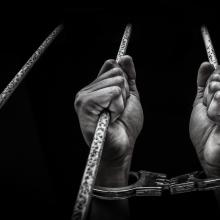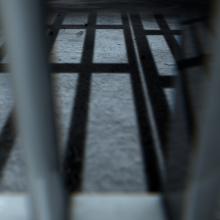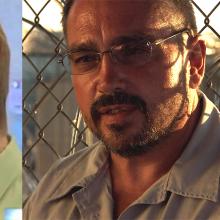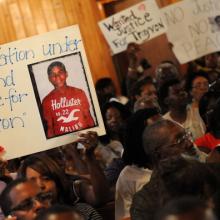criminal justice system
MY DREAMS ARE dominated by repairing the harms of mass incarceration. I dream of a future that includes decarceration and prison closures, one where Black people aren’t at risk of fatal police interactions. I dream of a future for Black people where public safety isn’t defined by arrests and lengthy prison terms. My Black future dreams are radical in the context of America. If my dreams were currently possible, the anti-Black through line that characterizes the nation’s public safety strategy would look a lot different.
Violent crime rates tripled between 1965 and 1990 in the United States, Germany, and Finland. Yet, countries have the policies and prison populations they choose. German politicians chose to hold the imprisonment rate flat. Finnish politicians chose to substantially reduce their imprisonment rate. American politicians chose to lengthen prison terms and send more people to prison. When migrant populations, some from the Global South, began moving into Germany and Finland, they were soon overrepresented in the prisons, incarcerated at twice the rate of citizens. Ethnic disparities and anti-Blackness drive incarceration policies everywhere.
Even in the context of increases in crime, the United States could choose another way. Public safety strategies could be centered on undoing the anti-Black practices that dominate criminal legal policies. Solutions must reduce the number of people imprisoned and strengthen communities rather than disappearing Black people from families and loved ones.
Faye Brown was 23 when she went to prison. This week a coroner will report that Brown died at a local hospital of complications from the coronavirus at the age of 67.
The continued demise of faith in this nation’s criminal justice system, elected officials, and government will increase wherever injustice is maintained in the name of “doing just enough”. If America is truly to be one nation, it must address and correct its patterns of injustice and persistent denials of full personhood for those who belong in this country and society.
The U.S. Congress on Thursday gave final approval to bipartisan legislation supported by President Donald Trump that would bring sweeping changes to prison sentencing and the treatment of inmates during incarceration and following their release.
This bill is very aptly named. The First Step Act is just that and no better — a first, extremely modest step on what will need to be a much longer path of extensive reforms to a deeply broken system. That system can best be understood, as Bryan Stevenson and others have so clearly pointed out, as the direct evolution of slavery into the system of mass incarceration.
"She had to take matters into her own hands believing that if she didn’t stop her father, it was just going to get worse and eventually somebody was going to die," Ian Friedman, Bresha's lawyer, told The New York Times.
Outside of his role in our family, my grandfather played three roles in life that were dear to him: die-hard Mets fan, deacon in his church, never-miss-an-election voter. He was so unbelievably clear in his intention about voting, and perfectly committed to voting. He made that connection between faith and action.
And in his way, he lived out something I think about all the time: how to make our presence in the world powerful enough to change it.
People of color in the United States, particularly young black men, are burdened with a presumption of guilt and dangerousness. Some version of what happened to me has been unfairly experienced by hundreds of thousands of black and brown people throughout this country. As a consequence of our nation’s historical failure to address the legacy of racial inequality, the presumption of guilt and the racial narrative that created it have significantly shaped every institution in American society, especially our criminal justice system.
Like many comic book fans, I spent the weekend binging on Daredevil, Marvel’s newest release. The entire first season was created for Netflix, and it dropped in its entirety on Friday. I waited until Saturday night to dig in (longer than some friends of mine), and I was hooked from the opening scene.
It's a scene that opens with Matt Murdock (lawyer-by-day alter ego of the masked vigilante Daredevil) sitting in a confessional. He begins by telling the priest about his father, a boxer who fought harder than his record could ever show. He ends the conversation by asking not for penance, but for future forgiveness — forgiveness for what he’s about to do. “That’s not how this works,” the priest says.
Yet so much of how Murdock as Daredevil works in this latest iteration of the character is how we want it to work. Based closely on Frank Miller’s writing of the character, Daredevil proves to be someone who deals justice unflinchingly. This isn’t someone who hesitates when the situation allows for a grim, overly firm hand. Contrast this with Batman, a character who struggles to commit severe violence even when it seems to be the only option.
We don’t know what prompted Rev. Franklin Graham to log onto Facebook and pound out the words that lit a firestorm last week. But within one day, tens of thousands of his faithful followers liked and shared his short, patronizing post that called “Blacks, Whites, Latinos, and everybody else” to “Listen up” and tune in to his take on why so many black people have died at the hands of police officers recently. According to Graham, the problem is “simple.” It can be reduced to their lack of obedience and bad parenting.
By Monday morning, more than 80,000 people shared the post and almost 200,000 liked it. Sojourners’ Jim Wallis penned a strong response.
On Friday an evangelical pastor based in Oakland, Calif. (the birthplace of the Black Lives Matter movement), Dominique Gilliard, shared the post with a small diverse group of evangelical leaders who decided to craft a collective response. This open letter was crafted by the collective efforts of Rev. Leroy Barber (CCDA and Word Made Flesh), Gilliard (New Hope Oakland), Dr. Brian Bantum (Seattle Pacific University), Micky ScottBey Jones (Transform Network), Efrem Smith (World Impact) and me (Sojourners). We didn’t know if our words would resonate. We only knew the truth that we must speak in response to Graham’s outsized influence coupled with apparent ignorance. In the end, a broad representation of national evangelical leaders agreed to sign this letter to Graham as principal signatories.
We invite you to read it, discuss it in your churches, and add your name to the many who say “No more!” We will not tolerate this type of flippant, patronizing commentary from faith leaders on critical issues that mean life and death for many in the body of Christ and in communities across America. We won’t tolerate it, even one more day. Rather, we invite all with open hearts to enter into dialogue — and to join us in the ministry of the gospel — the ministry of reconciliation.
That is also us, the possibility of us, if the wonderful accident of our birth had taken place elsewhere: you could be the refugee, I could be the torturer. To face that truth is also our burden. After all, each of us has been the bystander, the reasonable person who just happens not to hear, not to speak, not to see those people, the invisible ones, those who live on the other side of the border. - Karen Connelly, The Lizard Cage
It was a little over two weeks ago that Marlo entered Atwood Hall here in Lexington federal prison. Nearly all the women here are nonviolent offenders. When I first saw Marlo, her eyes seemed glued to the tiled floors as she shuffled along hallways. I guessed her age to be 25 or so. A few days later, she came to a choir rehearsal. She was still shy, but she looked up and offered a quiet smile when she joined the soprano section. The next time our choir gathered, Marlo raised her hand before we ended our rehearsal. "I got something to say," she said, as she stood. "When I first came here, I can tell all of you now, I was terrified. Just plain terrified. I have 70 months, and I felt so scared." The intake process for this, her introduction to the prison system, had badly frightened her, but before sundown that same day, a second intake process had occurred, with several inmates finding her, reassuring her, and getting her beyond that first panic.
During my four stints in U.S. federal prisons, I've witnessed long-term inmates' unconquerably humane response when a newcomer arrives. An unscripted choreography occurs, and the new prisoner finds that other women will help her through the trauma of adjustment to being locked up for many months or years. Halfway through a 3-month sentence myself, I'm saddened to realize that I'll very likely adapt to an outside world for which these women, and prisoners throughout the U.S. prison system, are often completely invisible.
The Bureau of Prisons contacted me today, assigning me a prison number and a new address: for the next 90 days, beginning tomorrow, I’ll live at FMC Lexington, in the satellite prison camp for women, adjacent to Lexington’s federal medical center for men. Very early tomorrow morning, Buddy Bell, Cassandra Dixon, and Paco and Silver, two house guests whom we first met in protests on South Korea’s Jeju Island, will travel with me to Kentucky and deliver me to the satellite women’s prison outside the Federal Medical Center for men.
In December 2014, Judge Matt Whitworth sentenced me to three months in federal prison after Georgia Walker and I had attempted to deliver a loaf of bread and a letter to the commander of Whiteman Air Force base, asking him to stop his troops from piloting lethal drone flights over Afghanistan from within the base. Judge Whitworth allowed me more than a month to surrender myself to prison; but whether you are a soldier or a civilian, a target or an unlucky bystander, you can’t surrender to a drone.
When I was imprisoned at Lexington prison in 1988, after a federal magistrate in Missouri sentenced me to one year for planting corn on nuclear missile silo sites, other women prisoners playfully nicknamed me “Missiles.” One of my sisters reliably made me laugh today, texting me to ask if I thought the women this time would call me “Drones.”
It’s good to laugh and feel camaraderie before heading into prison. For someone like me, very nearly saturated in “white privilege” through much of this arrest, trial, and sentencing process, 90 percent (or more) of my experience will likely depend on attitude.
I started this year in solitary confinement.
It’s not that I am regularly in prison or that I had behaved so badly. I was simply in a mock solitary cell located in the sanctuary of a church. I was only there for an hour. I knew I would be getting out.
But that hour did offer a glimpse into the world of how solitary confinement is used – and abused – in our nation’s prisons. And it offered a glimpse at the reform efforts that are gaining steam all across the country, including in my home state of Wisconsin.
When Kate Edwards, a Buddhist chaplain who has worked in the Wisconsin prison for the past five-and-half years, closed the door behind me, I was alone, but hardly in silence.
I was in Ferguson Wednesday when it happened: In a morally stunning decision, a Staten Island grand jury announced it would not bring criminal charges against a white police officer who choked a black man to death during a brutal incident last July. Stopped for allegedly selling some loose and therefore untaxed cigarettes, officer Daniel Pantaleo put a “chokehold” on Eric Garner, despite the fact that the move is against NYPD rules. Video of the incident shows Garner uttering his last words, “I can’t breathe.” New York’s medical examiner officially called this a “homicide,” but the grand jury said no charges will be made.
Of course, this comes just 10 days after the Ferguson grand jury decision not to indict another white police officer, Darren Wilson, for fatally shooting an unarmed black teenager named Michael Brown on Aug. 9. Sojourners had convened a retreat in Ferguson for both national faith leaders and local pastors to look deeply at the historical and theological foundations of the Ferguson events and reflect upon how the church must respond. Emotional calls from pastors in New York City came with the horrible news, and people just began to weep — one young man wailing, “This time it was all on video …. and it still didn’t matter! How can I as a black man bring a black son into this world?” Lament and prayers followed with a resolve from an extraordinary two days on the ground in Ferguson — to act.
Local experts in St. Louis County helped us understand the damage done to their local communities for decades that led to the response that erupted after the killing of Michael Brown. We walked silently and prayerfully alongside the memorial to the slain teenager on West Canfield Avenue with black parents imagining their own sons lying there, and white parents realizing this would never happen to our kids. We kept looking at the street where this bloody incident had taken place, feeling more and more doubt about the narratives the county prosecutor had used to exonerate and excuse the white police officer from any responsibility — or at least a trial to publically sort out “conflicting testimonies.”
We met in a church with seven young leaders of the Ferguson protest movement. In just 116 days, these young people had become self-educated and extraordinary leaders, and we listened to a compelling analysis of their urgent situation and how they were trying to apply the history of social movements to change their oppressive circumstances. Their chilling stories of police harassment and brutality, preceded by a narrative of the educational and economic brutality that black young people like them experience daily were transforming words for those of us who listened, spellbound. As I listened, I realized America would be converted by these young people’s honest and earnest conversation — they would win the national debate about our criminal justice system’s response to young people of color.
There’s this microaggression happening online, offline, and all around that has a nice sentiment, but really needs to stop. Can we call for a week-long moratorium on decrying “ALL LIVES MATTER?”
This is a request specifically for my white brothers and sisters, especially those in the church.
I, of course, as a white heterosexual married middle-class highly educated American male, believe that all lives matter. It’s something I’ve been fighting for my entire adult life. Whether it is the mother infected with HIV by her wayward husband in western Africa, whether it is the undocumented immigrant father who may be separated from his American-born children, whether it is the NRA card-carrying white uncle who does an honest job and is a good neighbor back in the midwest, whether it is the homeless thirty-something woman coming off a bad meth addiction but needing shelter during a difficult winter, of course, by all means, every life matters.
Your life matters. My life matters. All lives matter.
This is a non-negotiable. This is true. This is what it means to be made in the image of God, as we’re told in the Book of Genesis — everyone, whether you’re white, black, brown, male, female, straight, gay, bisexual, transgender, Republican, Democrat, rich, poor, nice, kind of a jerk, young, old, middle-aged, we all matter.
But these past couple weeks — these past four months, five months, 22 months? — it’s important that we stand with the ever-growing chorus and declare, yes, black lives matter. With the heartbreaking, soul-wrenching death of Michael Brown, the news just yesterday of another non-indictment in the death Eric Garner, or the dark night when Trayvon Martin was shot down in Florida, a chorus of voices has risen to declare with one voice and hashtag that #BLACKLIVESMATTER.
I recently watched Eugene Jarecki’s remarkable documentary, The House I Live In, which is about the American ‘war on drugs’ and the burgeoning prison population it engendered and continues to engender.
Rarely do I find myself murmuring and tsk-tsking during a movie, but this one was highly affecting — an intimate look at how history, racism, economics, and politics have created a system that no one is proud of and no one really likes. Even the cops and prison guards who claim to love their jobs express unease with the human suffering and unbalanced scales of justice that lead to it.
One particular story has stayed with me.
A man named Kevin Ott was found in possession of a small envelope of meth; prior to that he’d been arrested twice, again for possessing small amounts of illegal drugs (meth and marijuana).
He’s been in prison for seventeen years. And he will be there until he dies: Ott is serving a life sentence without the possibility of parole. Because he was a three-time offender, his state’s mandatory sentencing laws required that he be put away for life.
On February 26, 2012 in Sanford, Fla., George Zimmerman shot and killed Trayvon Martin, an unarmed 17-year-old boy. Zimmerman, 28, a neighborhood watch "captain," says he was acting in self-defense, and — incredibly — Zimmerman has yet to be arrested or charged with a crime.
However, thanks to the organizing efforts of Mr. Martin’s parents, civil rights groups, media commentaries, and concerned citizens, our latest racialized miscarriage of criminal justice is now getting the widespread attention that it deserves.
On Monday, the US Department of Justice and the Federal Bureau of Investigation (FBI) announced it would launch an independent investigation into the causes and circumstances of Mr. Martin’s death.

















